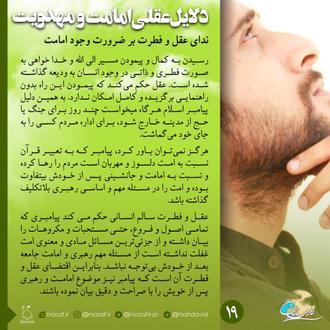In the subject of “Mahdavi Prayers and Salutations”, we are going to study topics like prayers related to Imam Mahdi (PBUH)
some special prayers for days and months, resorting to Imam Mahdi (PBUH), Ziarahs (a type of salutations) and …We recommend all of you, helper to Imam Mahdi (PBUH), to find the book of Sahifah Mahdiah by Sayyed Murteza Mujtahedi Sistani and use it.
The prayer of Imam Mahdi (PBUH)
Qutb Ravandi writes: “The prayer of Imam Mahdi (PBUH), may our souls be his ransom, has two Rakats. In each Rakat the Surah “AL-FAATEHAH” should be recited and once arriving “Thee do we worship, and Thine aid we seek” this verse should be repeated 100 times and after finishing the prayer, salute Prophet Muhammad (PBUH) and his progeny100 times and then ask Allah your need.” (Da’avat Ravandi, p. 89)
This prayer is not exclusive to special time and place and reciting a Surah is not obligatory after the Surah “AL-FAATEHAH” and no specific benediction is recommended after the prayer.
The prayer of the Holy Mosque of Jamkaran
Hasan ibn Muthlah says: “My master, Imam Mahdi (PBUH), told me: “People should be eager for (come to) this place (Jamkaran) and cherish it and offer 4 Rakats of prayer: two Rakats for salutation and honor of the mosque and in each Rakat recite the Surah al-Hamd once and the Surah al-Ikhlas seven times and recite the special dhikr (invocation) of every Rukoo (bowing with the hands on the knees) and Sujud (prostration) seven times.
And after those, two Rakats for Imam Mahdi (PBUH), in each Rakat recite the Surah “al-Hamd”, once reaching “Thee do we worship, and Thine aid we seek”, repeat it a hundred times, then finish the Surah “al-Hamd” and recite the Surah “al-Ikhlas” after that and recite the special dhikr of every Rukoo and Sujud seven times and offer the second Rakat the same way. When the prayer is completed, say “There is no God but Allah” and recite the Tasbih of Lady Fatimah (PBUH) and prostrate and recite salutation a hundred times.”
“Then he said: “Anyone who offer this prayer is like he has offered it in the Kaaba.””
(Jannah al-Ma’va, p. 231)
Read the rest


